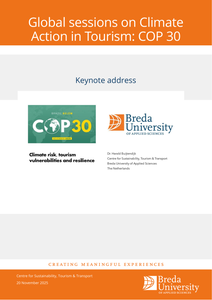DOCUMENT

How to reduce carbon emissions and contribute to climate change mitigation? For years the carbon-intensive travel industry has been struggling with this question. Research has addressed the relation between climate change and tourism (e.g., Gössling et al 2015; Becken, 2013; Gössling, 2010; Gössling et al 2010; Bows et al, 2009). Their work produced models and measurement methods, and recommended mitigation policies and actions (Scott, 2011; Dwyer et al, 2010; Gössling et al 2010; McKercher, 2010). Major industry players have since adopted carbon reduction measures in their CSR policies (Thomas Cook group, 2015; TUI Group, 2015). However, the bulk of the travel industry consists of SMEs that typically have limited resources available for CSR. CARMACAL may offer a solution for the sector at large. CARMACAL is a user-friendly application that enables tour operators to accurately measure the complete carbon footprint of their tour packages and integrate carbon management in their business (CSTT, 2016a). The industry acknowledged its relevance: in April 2016 CARMACAL won the WTTC Tourism for Tomorrow Innovation Award
MULTIFILE
The general aim of this research project has been to examine this phenomenon of tourism flow switching and consider the factors driving the geopolitical instability that can compromise destination security. On a more practical level the research has also examined what the reactions of Dutch tourists are to security threats affecting their tourism decisions and looked at the development of preventive measures against attacks by destinations and travel organisations. Finally, the research on the regional geopolitics of the MENA and European areas have together with the attitudes of Dutch tourists towards destination security been used as inputs into a scenario planning process involving the steering group of tour operators who originally commissioned this research, as participants. This process has focussed on macro environmental analysis, identification of key uncertainties, and the development of resilient strategies for the future.
DOCUMENT

DOCUMENT

DOCUMENT
